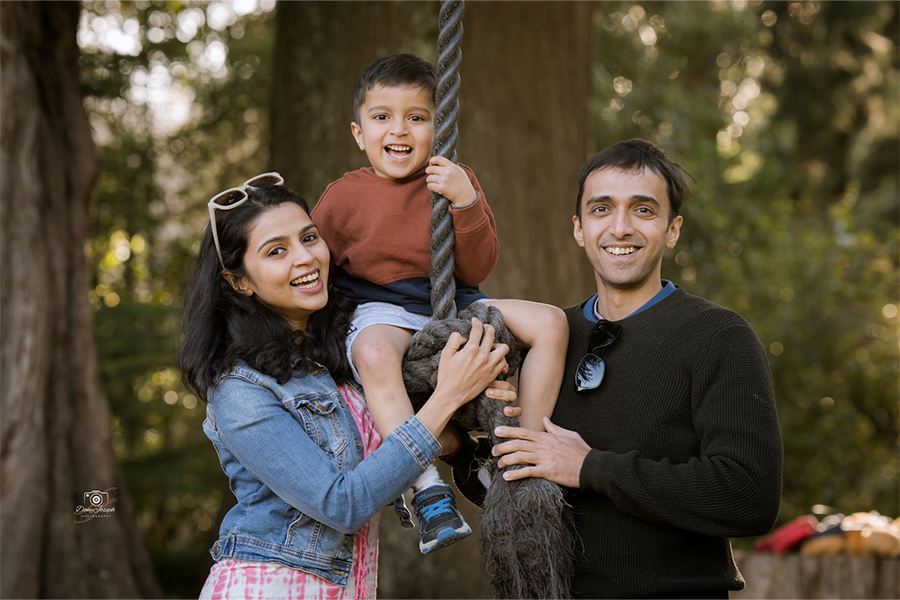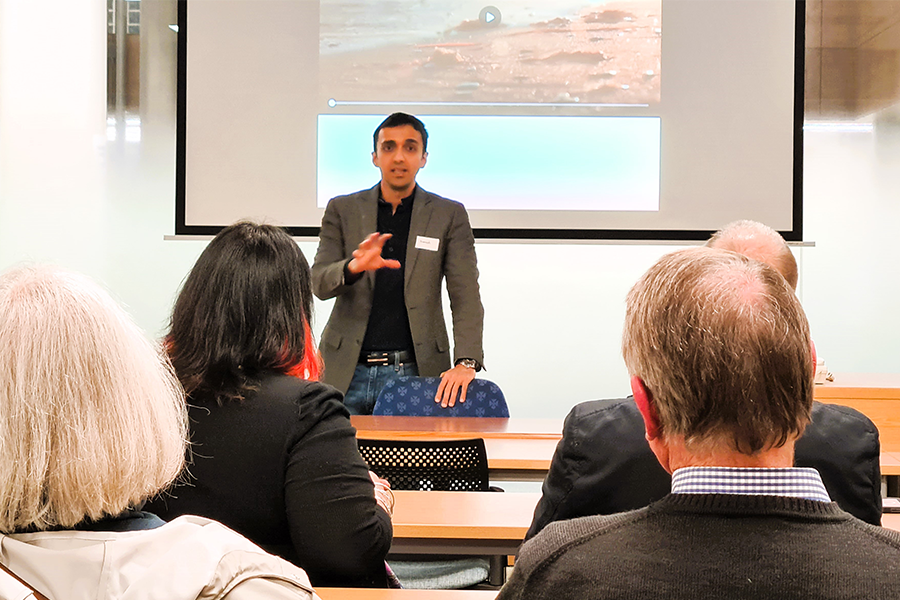
PhD student Naresh Nayak with his wife (and fellow PhD student) Namathra and their son Ankush.
In the early stages of the Covid-19 pandemic, managed isolation in New Zealand’s hotels played a key role in helping to contain the spread of the virus, even though managed isolation itself was not an especially enjoyable experience for most people. But this period did provide Otago Business School PhD student Naresh Nayak with a unique research opportunity.
For Nayak, who commenced his PhD in 2020 at the Business School, this period proved to be an ideal time to explore innovative approaches to reducing water consumption in the hospitality sector.
He reached out to local accommodation providers in Dunedin, with Chris and Adrienne Roy responding to the call. The Roys are the owners and managers of Aurora on George, a 26-room motel in Dunedin, and enthusiastically offered their property as a location to test various kinds of water conservation interventions.
The first Covid lockdown was the perfect time to enlist four of the hotel’s guestrooms as the setting for Nayak’s quasi-experimental investigation. A series of solo guests stayed in the rooms over the course of the experiment.
Each room was assigned a unique role: one served as the control group, the second featured an environmental appeal to encourage water conservation, the third used an emotional appeal for the same purpose, while those who stayed in the fourth room received factual information about the local water situation, accompanied by interactions with staff that focused on water conservation.
Additionally, water meters were installed in all four guestrooms to closely monitor cold and hot water usage. One feature of this experiment that stood out was the inclusion of simple four-minute sand-timers installed in the shower areas of all rooms except the control group room.

Nayak presenting his research findings to a group of Dunedin hospitality providers
Data gathered included levels of water usage and interviews with guests, which together demonstrated that a significant amount of water can be saved through simple but effective ‘soft’ interventions such as those given to guests who stayed in the fourth room.
“It was great to be part of Naresh’s research, and we are keen to put these measures into practice, which will save precious water and also hundreds or even thousands of dollars each year for us,” says Chris Roy.
Nayak’s journey to Otago began in 2020 when he and his wife Namathra had found themselves “at a crossroads. We decided to take a leap of faith and embark on a new adventure, pursuing our PhD degrees at Otago.”
Nayak’s passion for water conservation within the hospitality sector takes inspiration from his family’s roots as village farmers in southern Karnataka, India, and his father’s later foray into hotel management.
Bringing those two passions as together as a research subject sprung from a decisive first meeting with his PhD supervisors Dr Willem Coetzee and Dr Julia Albrecht. “This was a subject closely tied to the very strategies for water savings I had witnessed on our family farm,” says Nayak.
The road to academic success was not without its twists and turns though, as the challenges of COVID-19 loomed large. “Balancing full-time Ph.D. studies with the responsibilities of parenting an 18-month-old child presented us with unique difficulties.
“I must express my profound gratitude to our supervisors and Otago Business School. They stepped up in remarkable ways, offering support, guidance, and a sense of community that carried my wife and I through the darkest days of uncertainty.”
“I would also like to extend my heartfelt appreciation to Dr Brent Lovelock, whose steadfast presence and remarkable support have been a cornerstone in the Department of Tourism.”
Nayak says he is humbled to have had the opportunity to collaborate with a community that values sustainable practices, and where people recognise that small actions can have a profound impact.
He is soon to take up a role as a lecturer at the Business School at Royal Melbourne Institute of Technology in Saigon, Vietnam, where he will continue his passion for water management in the accommodation sector. In this new chapter of his career, he says he hopes “to inspire the next generation of scholars and make a meaningful impact in the field of water management.”
Kōrero by Sally Knox, Communications Adviser, Otago Business School